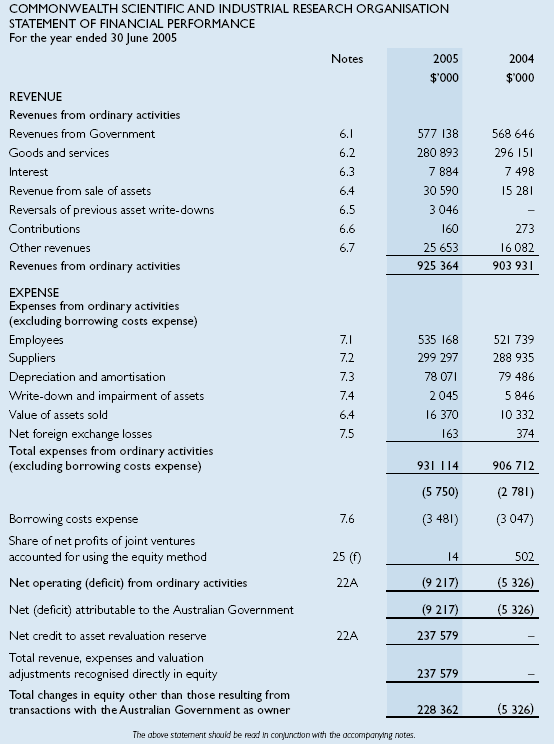|
|
The Commonwealth Scientific and Industrial Research Organisation (CSIRO)
published its 2004-05 Annual Report last week and it leaves the questions that
are most in need of being addressed, unanswered.
Much has been made in the mass media of the $9.2M deficit shown in its financial statement. Below is the first page of its financial statement and it shows that its total revenue for the 2004-05 financial year was $925M; its total expenditures from ordinary activities amounted to $931M while additional debts brought the figure up to something over $934M. In short the deficit was just on 1% of total revenue.
The Minister for CSIRO, Brendan Nelson, has made no public comment regarding the organisation's performance.
The matters that should be addressed are what has the Australian population received for the $608M the tax paying public have contributed ($577M + $30.6M -- revenues from government plus asset sales).
What the people should be told is just how much of the $600M contributed so generously by the Australian government in the name of its people has been used to generate the $281M designated as revenue for "Goods and services."
And such a calculation should include how many full time equivalent personnel were expended on pursuit of that revenue and that means both research and support staff.
Another significant but imponderable cost is the degree of distraction of research and support staff from research for the public good, i.e. research that if it fulfils its goal in the medium and long term ought to contribute significantly to the common wealth of the nation.
So just for the sake of argument, what if we attempt a "hypothetical" and say that it actually cost $450M of government funding, i.e. the use of personnel and resources on the strength, to generate that $280M. We've got a significant real deficit on our hands. Furthermore, the organisation's researchers and their immediate support staff are distracted not to say stressed by the situation of downplaying research for public benefit. In addition the particular projects which are deemed appropriate to be pursued as investigations for the public good are increasingly pushed for results in shorter timeframes.
The result is a self cannibalising organism. The quality of the work, diminishes, the quality of the organisations administration slides, the quality of the researchers that it attracts diminishes while simultaneously the cost to the nation increases.
Now, perhaps someone will come out of the woodwork and in high dudgeon rubbish the figure of $450M as the price for earning $280.
Well then just how much does it cost, and please itemise.

And The Canberra Times reports
Australia's peak science organisation, the CSIRO, will cut funds for crop and livestock research, exit medical drug discovery programs and scale back renewable energy research, according to an internal report leaked yesterday to The Canberra Times.
The 11 members of the direction setting workshop were CSIRO chief executive Dr Geoff Garrett, [acting chief executive] Dr Sandland, chief finance officer Mike Whelan, commercialisation director Nigel Poole, director of communications Donna Staunton, director of people and culture Peter May, head of science planning Michael Barber, director of leadership Dr Michael Eyles and three members of the organisation's group executive, Dr Steve Morton, Dr Alastair Robertson and Dr Rod Hill.
Alex Reisner
The Funneled Web
